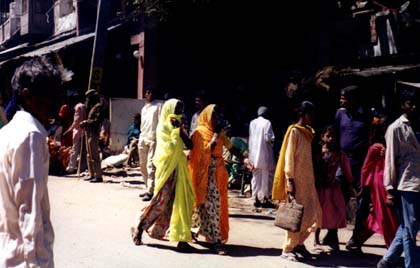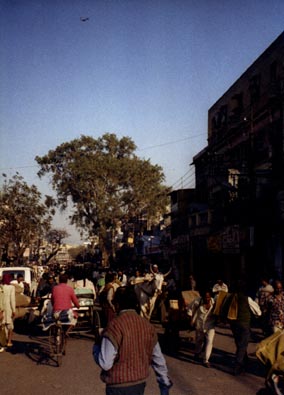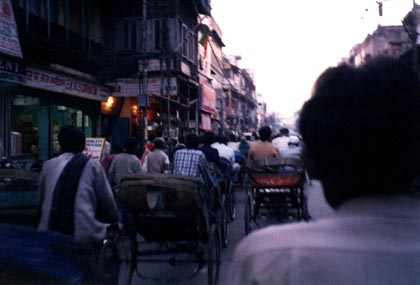Arrival
|
The on-board flight computer traces the line of our flight path on the small movie screen at the front of the cabin. As the hours pass, the line reaches from New York to Frankfurt, then from Frankfurt to New Delhi, India.
Imagine landing in a foreign land in the middle of the night. Perhaps it's happened to you, no imagination required. International flights often arrive in the wee hours of the morning at the Indira Gandhi International Airport in New Delhi, India. Could this be an attempt to disrupt the sleep patterns of those who live nearby? More likely, it's done to make the arrivees easy prey for the predatory taxi drivers and rickshaw wallahs who lie in wait just outside the terminal. Or maybe it's just karmic coincidence.
Customs, forms, pen and the propaganda of the Land Before Customs. In line, in limbo in the land between nations, a de-territorialized bubble that bursts into the International Arrivals Hall, which can be encountered near the beginning of a trip. It bears an uncanny resemblance to the Departure Lounge, which has been observed to gravitate towards the end of same journey. Both inhabit a twilight zone between worlds.
I'm fortunate enough to find myself in line next to two friendly Australians, a travelling pair who seem a comfortable couple from times past. The woman has been to India before, and is guiding her friend on a seven-week circuit of the Indian subcontinent. A colossal task, but they're obviously aware of this and aim to chew and digest all they can.
We move through customs, luggage retrieval and changing travelers checks for rupees at the airport bank. The Australian woman takes pity on my naivete, and suggests a pre-paid taxi, which we pre-pay. Then we push our way through the solid mass of taxi drivers outside the international terminal, searching for our pre-paid cab.
Enter, the taxi. We speed in darkness along crowded roads, weaving through motorized and pedal-powered traffic, dodging animals and pedestrians, the motor revving.
After the inevitable attempt to take us to a hotel that will give him a fat commission, the taxi driver leaves us, at the suggestion of the Australian woman, in front of the New Delhi Railway Station. We walk down the road through Paharganj, the tourist ghetto of Delhi.
The road is empty in the dark hours before dawn, its innumerable shops and hotels closed for the night. We lug our bags to a hotel the Australian woman has stayed at before. Still open, one of the few hotels with a light in the window, with two desk clerks inside struggling to burn the midnight oil.
I take a room with two small beds. The smallest noise echoes off the cement walls and along the carpetless cement floors.
Darkness, temporary peace in tentative sleep. Does sleep come? An eerie boundary along the border of consciousness and dreams is shattered by what sounds like someone coughing up a vital organ. The pained wheezing and hacking continues for a half hour or so, and occurs every morning at about the same time, echoing hollowly down the cold cement halls. ItŐs no mystery that more than a third of the population of Delhi complain of respiratory ailments, for the polluted air appears a soupy, hazy brown.
Dawn breaks, shadows shrink and the silence of night fades. Soon the streets are choked with auto rickshaws, cycle rickshaws, taxis, cars, buses, holy cows, fruit sellers, mistreated mangy dogs, and pedestrians who desperately dodge all of the above. |
 |
 |
 |
 |
|
The din of vehicle horns is ubiquitous from early morning until night. The air is brown, thick and often choking to taste. Life appears a frenzy of activity, chaotic perpetual motion where each seemingly random element follows its chosen path to form a cohesive whole.
Bustling markets. Multi-storied earthen buildings. A train station crowded with tracks and people and luggage. A red fortress spread across a grassy expanse. Wide tree-lined presidential avenues and narrow alleyways. A camel, an elephant - modern dinosaurs. Layers of movement drag one breathless into the frenetic pace, yet the mood is relaxed. There's time to talk to a friend, old or new; time to contemplate; time. The movement continues, while the moment floats above it, suspended in time.
After a day and a half in Delhi, I find myself yearning for open space, for village life. The fortress cities and Thar Desert of Rajasthan seem like a good place to begin. I wait in long lines at the New Delhi railway station and buy a ticket. |